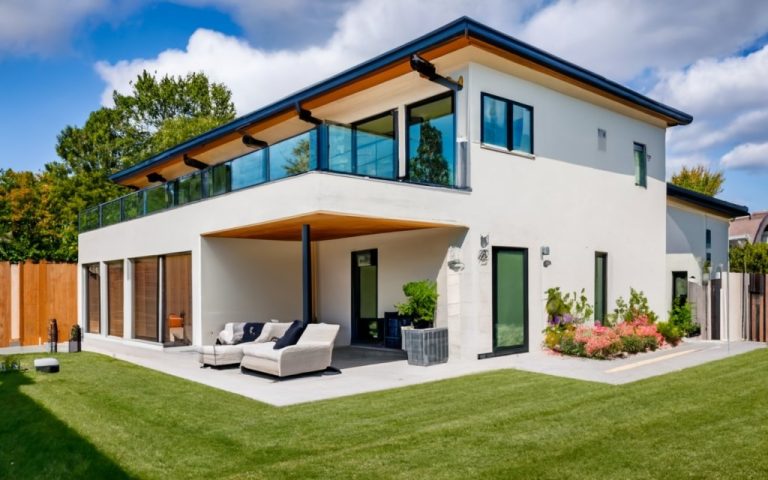Unlocking the Potential of Your Property
The real estate landscape is evolving, and savvy homeowners are capitalizing on the trend of Accessory Dwelling Units (ADUs) to enhance their property value and generate additional rental income. ADUs, such as garage and existing structure conversions, offer versatile options for homeowners looking to maximize their space. In this comprehensive guide, we’ll explore the top ADU conversion ideas to transform your underutilized spaces into valuable assets.
Benefits of ADU Conversions
Investing in an ADU conversion comes with numerous advantages. You can increase your property value, secure a steady stream of rental income, and provide a housing solution for family members in need. It’s a win-win situation that can significantly impact your financial well-being.
Increased Property Value
One of the primary benefits of ADU conversions is the substantial increase in property value. According to a study conducted by Zillow, homes with ADUs tend to sell for significantly more than those without. The additional living space and income potential make your property more appealing to potential buyers.
Additional Rental Income
ADU conversions provide homeowners with a consistent source of rental income. Whether you choose to rent out your ADU on a long-term basis or use it for short-term rentals, such as Airbnb, the financial benefits are substantial. ADUs can help offset your mortgage or provide extra income for other expenses.
Housing Solution for Family Members
ADUs also offer a housing solution for family members, such as aging parents or adult children. This option allows your loved ones to have their own space while remaining close to the family home.
Legal Considerations
Before diving into your ADU project, you must be aware of the legal landscape. Zoning regulations, permitting requirements, and potential property tax implications need to be carefully considered to ensure a smooth ADU conversion process.
Zoning and Permitting Requirements
Zoning regulations vary by location, so it’s essential to check with your local planning department to understand the specific requirements for your area. Some common considerations include setbacks, height restrictions, and the maximum allowable square footage for ADUs.
Obtaining the necessary permits is crucial. You may need building permits, electrical permits, and plumbing permits, depending on the scope of your ADU conversion. Working with a professional who understands local regulations can be immensely helpful.
Property Tax Implications
It’s important to be aware of the potential property tax implications of adding an ADU to your property. Some areas have rules that allow for a temporary or permanent increase in property taxes due to ADU additions. However, there are exemptions and tax incentives available in many places to encourage ADU development. Check with your local tax assessor’s office to understand the specific rules in your area.
Garage ADU Conversion Ideas
Garages are often underutilized spaces that can be transformed into valuable ADUs. Let’s explore various garage conversion ideas:
1. Studio Apartments
Convert your garage into a stylish and functional studio apartment. This popular choice offers a self-contained living space that’s perfect for singles or young couples. With an open floor plan, a well-designed studio apartment can feel spacious and comfortable.
2. One-Bedroom Apartments
For a more spacious ADU, consider turning your garage into a one-bedroom apartment. It’s an attractive option for small families or tenants seeking more privacy. A one-bedroom layout can include a separate bedroom, a living area, a kitchen, and a bathroom.
3. Home Office or Studio Space
Utilize your garage as a home office or creative studio. The ample space allows for a comfortable and productive work environment. With the rise of remote work and the need for dedicated workspaces, a garage conversion into a home office has become a sought-after option.
4. Guesthouse or In-Law Suite
Create a cozy guesthouse or in-law suite in your garage. This is a fantastic option for hosting guests or accommodating family members. An in-law suite typically includes a bedroom, a living area, a small kitchenette, and a bathroom, providing all the comforts of home.
5. Fitness or Yoga Studio
For fitness enthusiasts or yoga practitioners, converting your garage into a specialized studio can be an excellent choice. Install gym equipment, mirrors, and a sound system for an ideal workout space. Large garage doors can be replaced with windows to provide ample natural light.
Existing Structure ADU Conversion Ideas
Beyond garages, existing structures such as basements, attics, detached buildings, and bonus rooms offer promising ADU conversion opportunities. Let’s explore these ideas further:
1. Basement Conversions
Maximize the potential of your basement by converting it into a fully functional ADU. This is a cost-effective way to create additional living space. A well-designed basement ADU can include a bedroom, a living area, a kitchen, and a bathroom. Proper insulation and lighting are essential to make the space inviting.
2. Attic Conversions
Transform your attic into a charming ADU. This can be an ideal space for a small, cozy apartment or a home office with a view. Attic conversions often require structural modifications, such as adding dormer windows for natural light and headroom. Adequate insulation is crucial for temperature control.
3. Detached Structure Conversions
If you have a separate structure on your property, like a toolshed or a small barn, consider converting it into a standalone ADU. This option provides a private living space for tenants or guests. Ensure the structure is structurally sound and suitable for conversion, and consider insulation and plumbing needs.
4. Bonus Room or Above-Garage Conversions
Take advantage of bonus rooms or space above your garage to create a valuable ADU. This option is both convenient and space-efficient. You can design it as a one-bedroom apartment, a home office, or a creative studio. Be sure to evaluate the structural integrity and access to utilities.
Design and Layout Tips
The design and layout of your ADU can significantly impact its functionality and desirability. Here are some key tips to consider:
Maximizing Space and Natural Light
Efficient space utilization is essential, especially in smaller ADUs. Consider multifunctional furniture, built-in storage, and smart design choices to make the most of the available space. Additionally, maximize natural light by adding large windows, skylights, or glass doors.
Open Floor Plans
Open floor plans create a sense of spaciousness in your ADU. By eliminating unnecessary walls and partitions, you can achieve a more versatile and comfortable living space. This design approach is particularly popular in studio apartments.
Energy-Efficient Features
Incorporate energy-efficient features into your ADU to reduce utility costs and make your property more appealing to environmentally conscious tenants. This can include energy-efficient appliances, LED lighting, and proper insulation.
ADA Compliance for Accessibility
If you’re aiming to make your ADU accessible to individuals with disabilities, consider ADA (Americans with Disabilities Act) compliance. This may involve wider doorways, accessible bathroom fixtures, and no-step entries. Adhering to ADA standards can broaden your potential tenant pool.
Budgeting and Financing
Accurate cost estimation and understanding of financing options are crucial for a successful ADU conversion. Evaluate the return on investment potential to make informed decisions.
Cost Estimation for ADU Conversions
The cost of an ADU conversion can vary widely depending on factors like size, location, materials, and labor costs. On average, the cost per square foot for an ADU conversion can range from $100 to $300. It’s essential to create a detailed budget that includes all expenses, such as construction, permits, design, and utilities.
Financing Options and Resources
Several financing options are available to fund your ADU conversion:
- Personal Savings: If you have the financial resources, using your personal savings is a straightforward option.
- Home Equity Loan: A home equity loan allows you to borrow against the equity in your home to fund your ADU project.
- Construction Loans: Some lenders offer construction loans specifically for ADU projects. These loans provide funding during the construction phase.
- ADU Financing Programs: Some cities and states offer financing programs and incentives to encourage ADU development. Research if there are any local programs available.
- Rental Income: If your ADU is designed for rental income, the income generated from your tenants can help offset construction costs.
- ADU Builder Financing: Some ADU construction companies offer financing options for their services.
It’s important to assess which financing option aligns with your financial situation and long-term goals. Consulting with a financial advisor can provide valuable insights into the best approach for your specific circumstances.
Return on Investment Considerations
Before proceeding with your ADU conversion, it’s essential to calculate the potential return on investment (ROI). Consider factors such as the local rental market, property appreciation, and the cost of your ADU conversion. If your ROI is attractive, the investment becomes even more compelling.
Hiring Professionals
Engage professionals like architects, contractors, and legal experts to guide you through the ADU conversion process and ensure that everything is done correctly and efficiently.
Architects and Designers
Collaborating with an architect or designer is crucial for creating a functional and aesthetically pleasing ADU. They can help you design the layout, select materials, and create a space that aligns with your vision. Additionally, they can ensure that your ADU complies with local building codes and regulations.
Contractors and Builders
Hiring a qualified contractor or builder is essential for the construction phase of your ADU project. They are responsible for coordinating all aspects of the build, including securing necessary permits, managing subcontractors, and ensuring the project stays on schedule and within budget.
Legal and Permitting Experts
Navigating the legal requirements and permitting process for ADU conversions can be complex. Consulting with legal experts who specialize in real estate and zoning regulations can help you avoid costly mistakes and delays. They can assist with zoning variances, permitting, and any legal challenges that may arise during the project.
When selecting professionals, be sure to conduct thorough research, check references, and ask for portfolios of previous ADU projects they have completed.
Case Studies
To gain a deeper understanding of successful ADU conversions, let’s explore a few real-life case studies:
Case Study 1: The Cozy Garage Studio
In a suburban neighborhood, Sarah and Tom decided to convert their two-car garage into a cozy studio apartment. The garage’s existing structure provided a solid foundation for the conversion. They added insulation, created an open floor plan, and installed large windows for natural light. The result was a beautiful, rentable studio that became a sought-after space in their community. The additional rental income allowed them to cover their mortgage and invest in further property improvements.
Case Study 2: The Attic Transformation
In an older home with an unfinished attic, John saw an opportunity. By investing in structural improvements and insulation, he transformed his attic into a one-bedroom ADU. The apartment had a separate entrance and a well-designed layout, making it a comfortable living space. John decided to rent it out to a young professional, and the income he received from the ADU significantly contributed to his monthly finances.
Case Study 3: The Detached Guesthouse
Linda had a small, unused barn on her property. She decided to convert it into a detached guesthouse. The project required substantial renovations, including new electrical and plumbing systems. With the help of a skilled contractor, she created a charming, fully functional guesthouse. Guests enjoyed the serene surroundings, and Linda received consistent income from short-term rentals. The success of her project encouraged other homeowners in her area to explore ADU conversions.
These case studies demonstrate the diverse possibilities and financial benefits of ADU conversions. By taking inspiration from these real-life examples, you can see how ADUs can add value to your property.
Sustainability and Green Building
Sustainability is a growing concern in the construction and real estate industry. Incorporating environmentally friendly practices into your ADU conversion can reduce your environmental footprint and make your property more appealing to eco-conscious tenants.
Environmentally Friendly Materials and Practices
When planning your ADU conversion, consider using sustainable building materials, such as reclaimed wood, recycled metal, and low-VOC (volatile organic compound) paints. These choices minimize the impact on the environment and create a healthier living space.
Energy-Efficient Systems
Install energy-efficient appliances and systems in your ADU to reduce energy consumption and utility costs. Energy-efficient HVAC (heating, ventilation, and air conditioning) systems, LED lighting, and programmable thermostats can make a significant difference in your property’s overall energy efficiency.
Benefits of Green ADU Conversions
Aside from the environmental advantages, green ADU conversions often attract tenants who are willing to pay a premium for eco-friendly living spaces. Highlighting the sustainable features of your ADU can set it apart in the competitive rental market and contribute to a positive reputation as a responsible property owner.
Marketing and Renting ADUs
Once your ADU is complete, it’s essential to effectively market and rent it to potential tenants. Here are some strategies for successful ADU marketing and rental:
Advertising and Reaching Potential Tenants
- Online Listings: List your ADU on popular rental websites, such as Zillow, Trulia, and Apartments.com, as well as local classified websites. High-quality photos and detailed descriptions are essential to attract potential tenants.
- Social Media: Utilize social media platforms to showcase your ADU. Create posts with appealing images and descriptions, and consider paid advertising to reach a wider audience.
- Local Rental Communities: Join local rental communities and forums to connect with potential tenants. Word of mouth is a powerful tool in the rental market.
- Property Management Companies: Consider partnering with a property management company to handle tenant screening, leasing, and maintenance.
- Open Houses and Tours: Organize open houses or virtual tours to allow prospective tenants to view the ADU.
Setting Competitive Rental Rates
Research the local rental market to determine competitive rental rates for your ADU. Factors such as location, size, amenities, and the quality of the ADU can influence the rental price. It’s important to strike a balance between earning a profitable rental income and attracting tenants.
Tenant Screening and Lease Agreements
Thorough tenant screening is crucial to ensure that you rent to reliable and responsible tenants. Check references, conduct background checks, and verify employment and income. Once you’ve selected a tenant, create a comprehensive lease agreement that outlines rental terms, responsibilities, and policies.
Maintenance and Ongoing Management
Successfully renting out your ADU requires ongoing maintenance and management. Here are some key considerations:
Regular Upkeep and Repairs
Maintain the ADU to a high standard to attract and retain quality tenants. This includes addressing routine maintenance tasks like HVAC system servicing, plumbing repairs, and landscaping upkeep. Respond promptly to tenant-reported issues to ensure tenant satisfaction.
Dealing with Tenant Issues
Tenant relationships are a vital aspect of ADU management. Be prepared to address tenant concerns or conflicts professionally and promptly. Effective communication and conflict resolution are essential skills for property owners.
Insurance Considerations
Review your insurance coverage to ensure that your ADU is adequately protected. A homeowner’s insurance policy may not provide sufficient coverage for a rental property. Consider landlord insurance or an ADU-specific insurance policy to safeguard your investment.
Conclusion
In conclusion, ADU conversions offer homeowners a myriad of benefits, from increased property value to additional rental income. By exploring the ADU conversion ideas discussed in this guide and following the best practices for design, financing, and management, you can maximize the potential of your property and contribute to the growing trend of ADU development.
Don’t miss out on the opportunities that ADU conversions can provide. Start your ADU journey today and unlock the full potential of your property.
For more information and resources on ADU conversions, visit the ADU Resource Center







